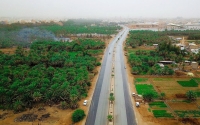
Agriculture in the Kingdom of Saudi Arabia is considered one of the pillars of the national economy in the Kingdom. The total cultivated area in the Kingdom for 2017 was approximately one million ha. Although agricultural activity takes place in all regions of the Kingdom, they are particularly concentrated in the Riyadh, Qassim, Hail, and al-Jawf provinces. 1 Agriculture in the Kingdom generally relies on groundwater. Therefore, the National Water Strategy aims to reduce reliance on non-renewa...

Water in the Kingdom of Saudi Arabia consists of a set of water resources leveraged by the country. The Kingdom relies on several resources to provide water, including: surface water, renewable groundwater, and non-renewable groundwater, 1 in addition to desalinated water and treated water. The Kingdom is the largest producer of desalinated water in the world with about thirty-three production systems located on the eastern and western coasts. 2 Water in the Kingdom is administered as per the W...
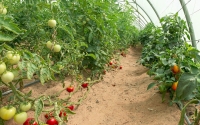
Agricultural techniques in the Kingdom of Saudi Arabia refer to the vital and technological tools in the field of agriculture. They are known in various contexts as agricultural technology, a discipline within the agricultural sciences that involves the use of scientific tools such as genetic engineering, molecular marker analysis, molecular diagnostics, vaccines, and tissue culture. all these sciences aim to achieve another concept, which is the modification of living organisms, including plan...
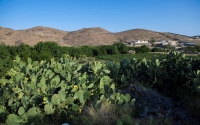
Seasonal Agriculture in the Kingdom of Saudi Arabia is the concept that refers to the period of the year characterized by changes in weather, environment, and daylight hours. Seasonal agriculture in Saudi Arabia is one of the elements contributing to achieving balanced and sustainable development within the agricultural sector, while also aiding in environmental preservation and the reduction of pollution levels. The development of seasonal agriculture reflects an increase in self-sufficiency r...
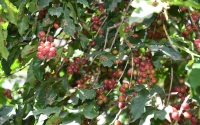
Coffee Cultivation in the Kingdom of Saudi Arabia is concentrated in the mountainous highlands of three provinces in the Kingdom: Aseer, al-Bahah, and Jazan. Saudi Khawlani coffee is considered one of the most expensive types of coffee in the world, due to the oily layer surrounding the fruit and its distinctive smell. Coffee cultivation is linked to Saudi coffee preparation, which is served at gatherings and social events in the Kingdom. History of coffee cultivation in the Kingdom Coffee cult...
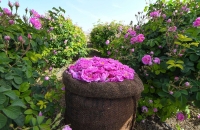
Rose Cultivation in the Kingdom of Saudi Arabia is one of the agricultures that spread in the Kingdom, starting from the stage of planting seedlings to the manufacturing of final rose products, such as perfumes and essential oils. Taif Governorate in Makkah al-Mukarramah Province is renowned for Taif roses, while al-Madinah al-Munawwarah is renowned for Madini roses, both becoming distinctive trademarks for them. Rose cultivation in Taif Governorate Taif Governorate has 860 farms producing abou...
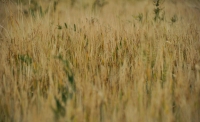
Barley Cultivation in the Kingdom of Saudi Arabia: Barley, recognized as a field crop, finds suitability for cultivation in select regions within the Kingdom. With the issuance of a resolution by the Council of Ministers to stop green fodder cultivation, including barley, in 2018, due to its significant water consumption, barley cultivation persists in the Kingdom on a limited scale and is subject to controls set by the Ministry of Environment, Water, and Agriculture. Regulations for barley cul...
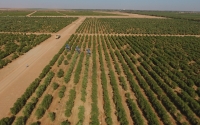
Olive Cultivation in the Kingdom of Saudi Arabia, the beginnings of olive cultivation in the Kingdom date back to 2002. During this time, the Olive Research Unit, affiliated with the Camel Research Center in Jawf Province in the north of the Kingdom, initiated the establishment of a genetic complex to study the cultivation of thirty olive varieties known to be abundant in olive-producing countries, e.g., Spain, Hellenic Republic, Syria, Jordan, Tunisia, and Morocco. Subsequently, nine of the...
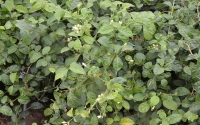
Jasmine Cultivation in the Kingdom of Saudi Arabia is a famous agricultural practice in Jazan, southwest of Saudi Arabia, where organized farms grow this aromatic plant, locally known as Arabian Jasmine. Jasmine is an integral part of Jazan's traditional heritage. With approximately 227,350 jasmine shrubs, the farms yield nearly 280 t of flowers each year. Jasmine cultivation in Jazan In Jazan, planting jasmine begins in spring, when the temperature is relatively low. Farmers regularly irr...
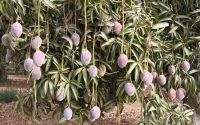
Mango Cultivation in the Kingdom of Saudi Arabia, mango cultivation actively started in Jazan Province , in the southwest of Saudi Arabia in 1982. The province now encompasses around one million trees of sixty cultivars, with an annual production rate of about sixty-five thousand t, part of which is exported across the globe. A local festival is held yearly to celebrate the mango harvest season. The mango harvest season begins in Saudi Arabia in mid-March and peaks in May. Harvested cultivars i...
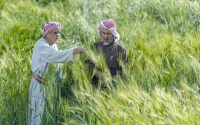
Wheat in the Kingdom of Saudi Arabia is one of the grains cultivated in the Kingdom. It's a fundamental food commodity. The Kingdom, represented by the General Food Security Authority (GFSA) (formerly the Saudi Grains Organization), aims to ensure food security for its residents and meet the needs of milling companies. this is done by purchasing wheat from local farmers, investing in overseas wheat farms, and importing wheat. The Kingdom maintains safe wheat stock levels, since the organiz...
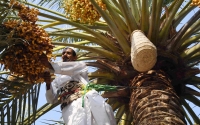
Rutab in the Kingdom of Saudi Arabia refers to the fourth of five phases in the ripening of the date palm fruit. It succeeds the Bisr phase, upon ripening. The first sighting of Rutab is referred to as Bakurat al-Rutab (first fruits of Rutab), with variations in types and kinds based on the level of ripening. Beginning of the Rutab season in the Kingdom The ripening of palm fruits is contingent upon elevated temperatures, thus the Rutab season typically commences during the summer, and the yiel...